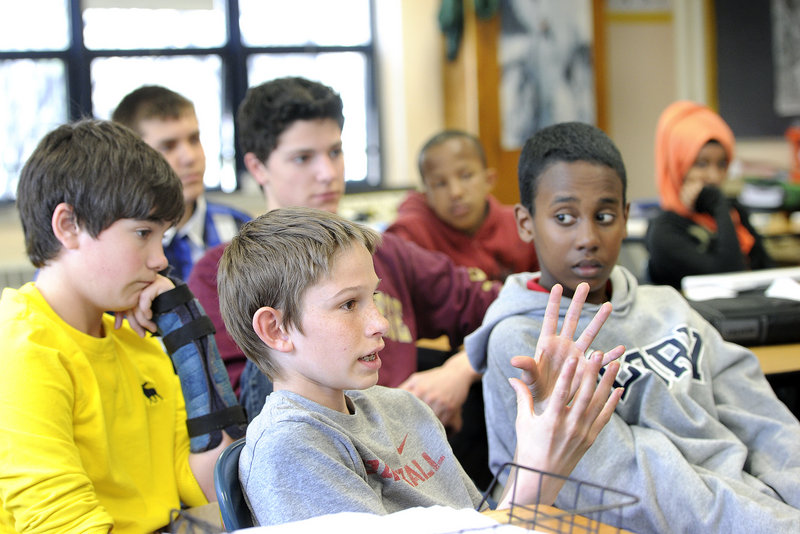PORTLAND – Maine students watched history unfold in real time over spring break last week instead of in the classroom.
On Monday, the first day back at school after a week of spring vacation, several social studies and history teachers at school districts around southern Maine said they tore up the lesson plans and used the day to discuss the Boston Marathon bombings.
“I did feel like it was really important to give them time to ask questions,” said Ericka Lee-Winship, who teaches Advanced Placement history and social studies at Portland High School. “We had such a rich conversation. It was really a great teaching moment.”
On Monday, suspect Dzhokhar Tsarnaev was charged by federal prosecutors in his hospital room with using a weapon of mass destruction to kill. He faces a possible death sentence. Officials have said Tsarnaev, 19, and his older brother set off the two pressure-cooker bombs at last week’s race that sprayed shrapnel into the crowds, killing three people and wounding more than 180.
His brother, Tamerlan, 26, died Friday after a fierce gunbattle with police.
Lee-Winship said the conversation encompassed a discussion of the history of Chechnya, Miranda rights and whether Tsarnaev could be considered an enemy combatant and tried in a military court.
Officials say Tsarnaev, an ethnic Chechen from Russia who has lived in the United States for about a decade, is a naturalized U.S. citizen, so he must be tried in federal court.
The fact that he is so young — several of Lee-Winship’s students are 18 years old — was shocking to some Portland High students.
“The seniors are looking around and saying it was crazy that someone their age could do something like that,” she said. “They kept saying, ‘It’s so crazy.’ They just couldn’t grasp that.”
Younger students in Portland focused on the fact that the attacks took place so close to their home, said Paul Clifford, a social studies teacher at King Middle School.
“The majority of my kids have been to Boston, their sports heroes are in Boston. It’s not like it happened in Ohio,” said Clifford, who set aside time in each of his three social studies classes Monday to discuss the bombings.
“I was just there,” said 13-year-old Haley Troiano. “I was thinking it could have happened when I was there.”
Another student in one of Clifford’s classes said an aunt was in the race and was near the finish line when the bombs went off. Clifford said a boy in an earlier class told his classmates he heard the explosion from a few blocks away.
Sitting in a small semicircle facing Clifford, the students chewed over many of the same questions being asked everywhere: Was it pertinent that it happened on Patriots Day? Were the suspects trained overseas? Why did they do it? Did religion play a role? Were more people involved than just the Tsarnaev brothers?
“Those are big questions,” Clifford told them.
“I think it makes us feel a little less safe,” said Natalie McClellan, 13.
The students knew most of the basic facts of the case, and talked about other bombings, terrorism and 9/11 — an event that took place before most of them took their first steps. The fact that the surviving suspected bomber was so young, and that friends had said he was a good guy, seemed particularly troubling to many students.
“It doesn’t really fit the profile,” said Maggie Lawless, 13. “To hear this guy was perfectly normal, that doesn’t make sense.”
Prompted by Clifford, the students generally agreed that the tragedy had brought Americans together.
Nick Archambault said he was moved when he saw fans at sporting events chanting “USA!” and singing the national anthem.
“It was really emotional to watch. I think people did come together more than before,” he said.
At Cape Elizabeth High School, a discussion about the bombings wound up focusing mostly on the media, said Ted Jordan, who teaches government and U.S. history.
“I was impressed by the students’ thoughtfulness about their remarks,” Jordan said, adding that they had recently finished coursework on the media.
Most of his students first learned about the attack online, and one student started following the Boston Police Department’s Twitter feed and used a website to listen to the department’s scanner. But they also noted that some media reports jumped to conclusions, and discussed how, at one point, it was reported incorrectly that an arrest had been made.
“I thought that this shows how media has changed over time and how we get our news has changed,” Jordan said.
— The Associated Press contributed to this report.
Noel K. Gallagher can be contacted at 791-6387 or at:
ngallagher@pressherald.com
Send questions/comments to the editors.



